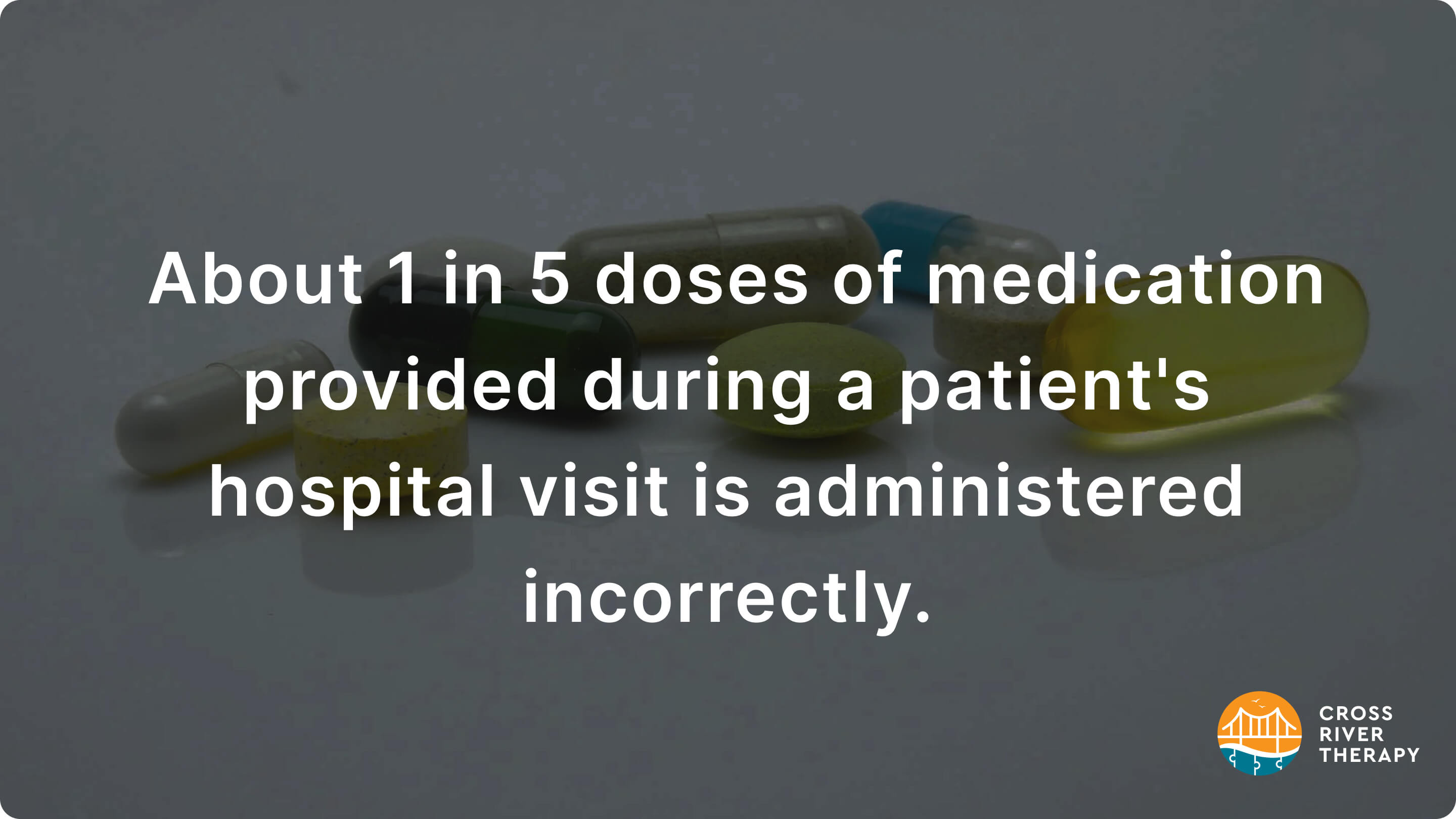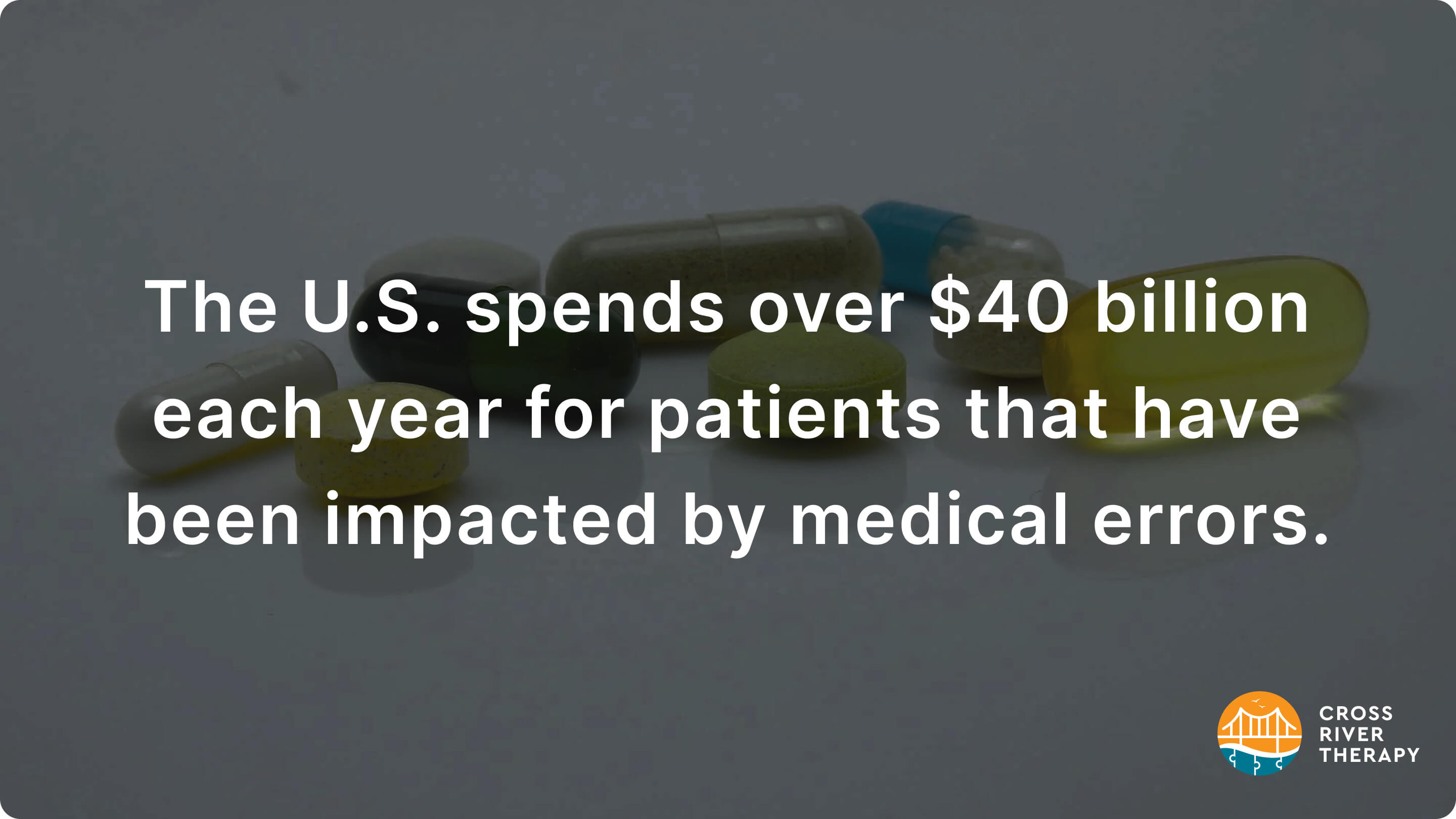29 Medication Errors Statistics & Facts
The FDA receives more than 100,000 reports of medication errors every year in the U.S. These medication errors statistics will scare you!

Key Medication Errors Statistics
- The US Food and Drug Administration receives over 100,000 reports of medication errors each year.
- 41% of US citizens have claimed to be the sufferer of a medical error. Sometimes, this was a personal encounter or from watching it happen to someone else, like a family or friend.
- There are over 7 million American patients that have been impacted in some way by medical errors each year.
- Every year, there are 7,000 to 9,000 Americans who die from medical errors.
- Approximately 530,000 injury incidents occur yearly in outpatient clinics due to medication errors.
- 10% of the patients in every hospital will be part of a medication error.

How Many Medication Errors Occur Each Year?
When medical administration happens, between an 8% and 25% average rate of medication errors.
7. When medication errors happen in the private homes of Americans, they occur around 2% to 33%.
8. Poor dispensing of medication results and documents happens between 0.0014% and 55% of the time.

9. One out of every five Americans has witnessed or been part of a medication error when getting health care from a medical institution.
10. About 1 in 5 doses of medication provided during a patient's hospital visit is administered incorrectly.

It's frightening for some patients to imagine themselves in a hospital or clinic, only to be given the wrong medication when told to take something by a doctor or nurse.
This can lead to more severe complications, especially if the problem is left unchecked or found out after the medication has fully metabolized into the patient's system.
11. Approximately 530,000 injury incidents occur yearly in outpatient clinics due to medication errors.

12. Elderly patients are at the most risk of being affected by medication errors while staying in a medical care facility, over two times greater than children and young adults.
13. Of the 100,000 reports that happen each year related to medical errors, 70% of them occur in hospitals, pharmacies, and patient residences.
The FDA describes medication errors as preventable circumstances that can result in poor medication usage or even harm to the patient. Medical errors are also liable to happen under the improper guidance of doctors, pharmacists, and other people in the medical field.
What Are The Main Causes Of Medication Errors?
The main causes of medication errors are clerical errors, poorly typed directions to nurses and doctors, reading mistakes, and getting the dosage of certain medications wrong.
With many causes of medication errors, it's normal that many government agencies, special interests, and nonprofits conduct research into them.
So do healthcare insurance agencies. However, the primary causes could be something as little as a doctor or nurse prescribing something from illegible writing mistakes.
Unfortunately, this can result in serious harm to patients.
A doctor, for example, could prescribe tablets by writing them down for a nurse to pick up and administer later.
If the writing is illegible, the nurse runs the risk of providing the patient with something that could result in their blood pressure rising or falling to a dangerous level from having never been given it before.
Mixing pills that shouldn't be combined is also easy to do this way. Other causes can be blamed on medical providers feeling sleep or allergies.
From an environmental standpoint, mistakes can happen quickly by taking the wrong bottle of pills and handing them over to the incorrect patient.
Pharmacies can also make such errors. Some may even provide the right medication, but in the wrong dosage or milligram percentage.
What Are Examples Of Medication Errors?
Here are some examples of medication errors happening at medical facilities.
Most doctors agree that the good dispensing of medication is predicated on the way that it's administered, whether it be in the shoulder, leg, or edible form.
As an example of this, antibiotics might or might not properly help in one's infection as much as an oral dosage can.
Proper administration is also impacted by the amount that's given and its concentration. For instance, miscalculating medicine that's based on a person's weight might give too little in milligrams. The patients in this example might not receive proper relief.
The days and duration of the time spent at a medical facility can also impact a patient. Using the example of a pet, if they're given only five months of total time spent going to the hospital instead of six, it may take longer for the pet to feel better.
The frequency of drugs administered by doctors could be a problem as well, such as when not enough pills are provided in good concentrations for them to get the relief that they need.
Selecting the right medication is very important. If done in error, life-risking instances can quickly develop.
This mistake has been found to happen when one is improperly diagnosed with something they don't have. If a misdiagnosis is done by a healthcare worker, they could easily give the patient something that they don't need, which doesn't come with their issue.
Staying away from the adverse effects of drug interactions is a key way that doctors can avoid medical errors.
They should question whether drug allergies are known, or if any other drugs that could react with what they wish to prescribe have previously been given to them. A related error for failure to do this could happen by not informing the patient on how certain medications are supposed to be taken.
Cost Of Medication Errors
14. The United States spends over $40 billion each year for patients that have been impacted by medical errors.

15. Preventable medication errors ended up costing Americans over $21 billion every year. This happens throughout the entire medical industry.
16. The world cost for medical errors is nearly 1% of the entire worldwide expenditure on health.
How Often Do Medication Errors Occur?
17. When medications are administered to patients, medical error rates happen between 8% and 25% of the time.
18. Medical errors in private residences have been studied to happen between rates of 2% and 33% of the time.
19. Poor dispensing of pills and other medications can end in medical error rates from 0.014% to 55%.
20. Approximately 1.5% of the prescriptions in a hospital setting have dispensing mistakes.
21. One out of five Americans has been involved in a medication error when being provided health care.
22. Nearly one in every five dosages of medication provided in a hospital are done so with mistakes being made.
23. 530,000 injuries occur annually in outpatient clinics due to medication errors.
24. Elderly patients are four times more likely to be impacted by medication errors than children.
Medication Error Mortality Rate
25. Every year, there are 7,000 to 9,000 Americans who die from medical errors.
26. Medical errors are the eighth leading cause of mortality in America.
27. In America, medication errors hurt over 1.3 million patients each year.

28. About one American dies each day from being the victim of a medical error.
29. 30% of injuries that are caused by prescriptions given to patients in hospitals happen from medical errors.
What Are Medication Errors?
A medication error, or medical error, is the improper administration of healthcare given to patients. Then can take place when pills are given in the wrong count, at the wrong dosage, or in the wrong quantity.
When drug info is inputted into a computer wrong, this also counts as a medical error. If the patient doesn't take the medication given to him right, a medical error can develop, particularly if a doctor provides bad, misleading, or improper information about the dosage. Any drug found in a pharmacy can also count.
The people responsible for them are typically doctors, nurses, and pharmacists, essentially anyone that works with patients, administers or directs their care while seeing them.
References
- https://www.amcp.org/about/managed-care-pharmacy-101/concepts-managed-care-pharmacy/medication-errors
- https://www.hopkinsmedicine.org/news/media/releases/study_suggests_medical_errors_now_third_leading_cause_of_death_in_the_us
- https://www.ncbi.nlm.nih.gov/books/NBK519065/
- https://www.who.int/news/item/29-03-2017-who-launches-global-effort-to-halve-medication-related-errors-in-5-years

Have Any Questions?
Whether you're curious about our services or need support, we're just a click away. Reach out or check our FAQs for quick answers.

